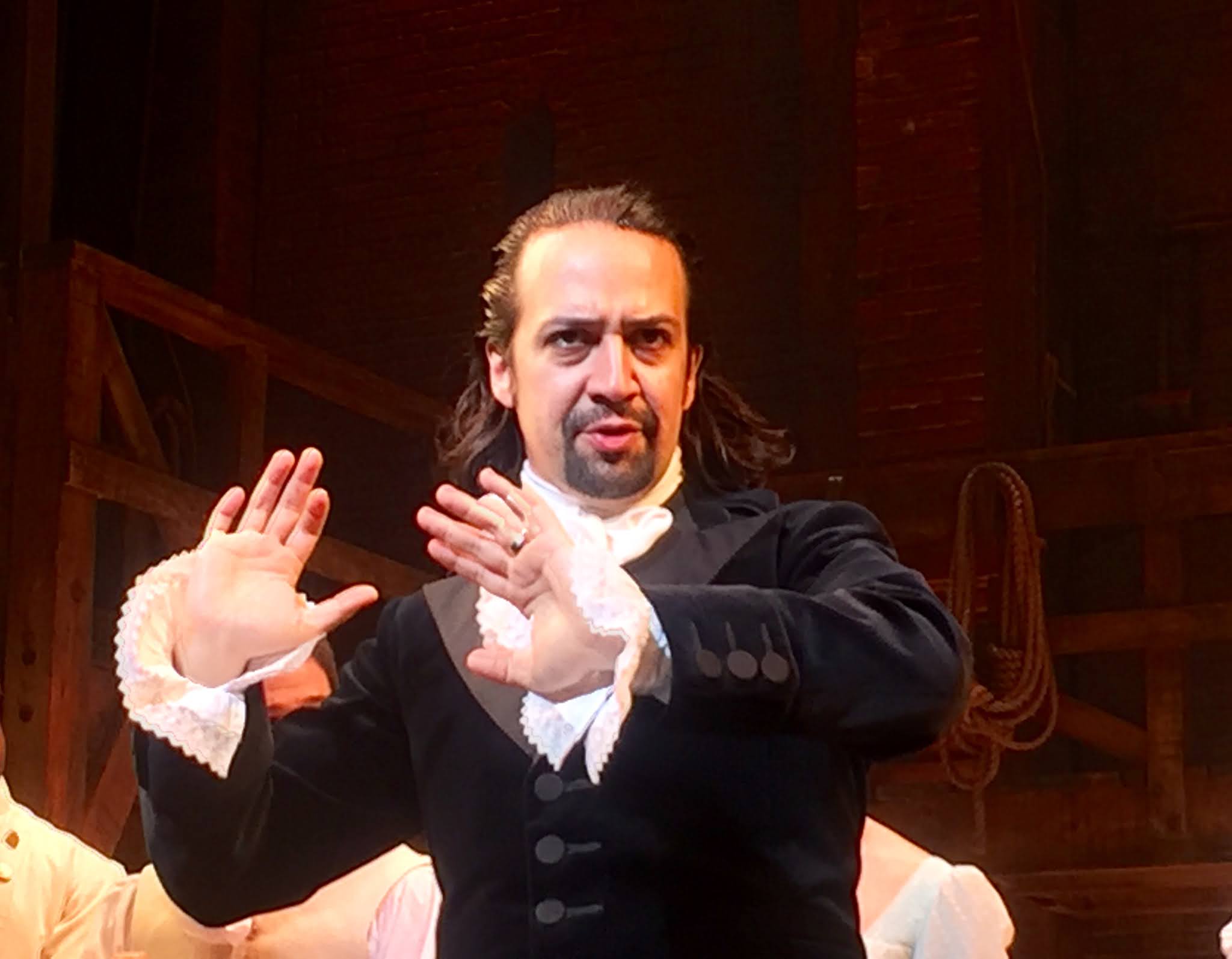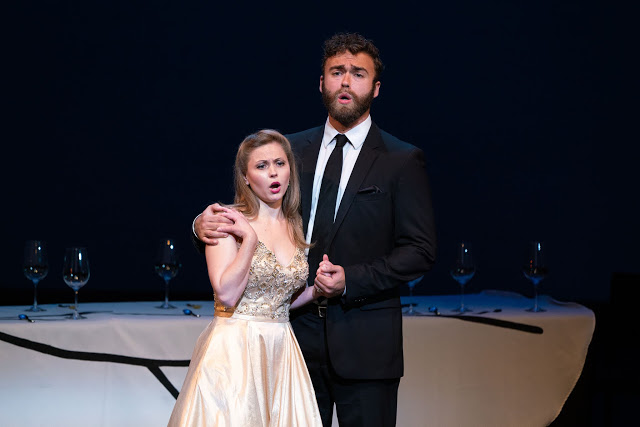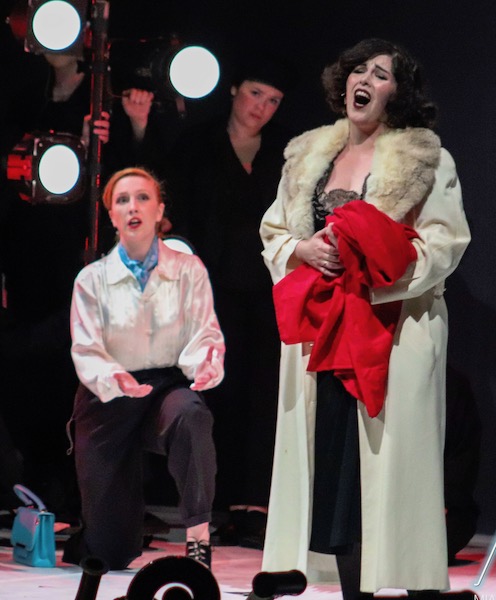A DUO OF DONS
 |
| Xiaomeng Zhang and Erik van Heyningen (Photo by Richard Termine) |
Mozart's 1787 masterpiece Don Giovanni was perfectly cast and magnificently performed by graduate students of the Juilliard Vocal Arts Department. One could not enjoy better performances on any of the world stages!
If you wanted an appreciation of baritone Hubert Zapiór's ability to create a complex character--an astute portrayal of sociopathic narcissism-- you would have three hours to do so. If you wanted an appreciation of his gorgeous instrument and the skills with which he employs it, you would have had to wait for his "Champagne aria" in Act I and his romantic serenade in Act II-- "Deh vieni alla finestra" which was accompanied by an onstage mandolin, played by George Meyer. It was our favorite moment of the evening, mainly because we love Mr. Zapiór's voice.
We will return on Friday night to see the Don of Xiaomeng Zhang and append the review. Keep reading!
The main feature of sociopathic narcissists is how sensitively they can suss out the desires of their prey and to charm their way into that place. However, this type of character is only interested in his/her own advantage and hasn't a care for the well being of the chosen victim. These features were successfully enacted in Mr. Zapiór's performance.
And what about his victims? Soprano Meghan Kasanders sang with full open tone that rose to the heights and created a believable character--the aristocratic Donna Anna who is shocked to learn that her would-be rapist and the slayer of her father (Il Commendatore) is fellow aristocrat Don Giovanni. Ms. Kasanders delivery of the difficult arias "Or sai chi l'onore" and "Non mi dir" could not have been better. We believed her sincerity.
Due to the consistency of his interpretation in the role of Don Ottavio, tenor James Ley projected feelings of strength as her supportive suitor. This was not the wimpy Don Ottavio that comes across as easily dismissible; oh no, this was a big-hearted and dependable fellow, and one who could dispatch both of his difficult arias ("Dalla sua pace" and "Il mio tesoro") with ease. This tended to shift the balance in his relationship with Donna Anna. We sensed a different and more satisfying direction in their future; we believed that she would come around and marry him!
The Donna Elvira of Maritina Tampakopoulos was not someone we could laugh at. Her love for Don Giovanni was not crazy, just misguided. The strength of her soprano lent verisimilitude to the characterization. The difficult "Mi tradi" was colored with more than anger and we realize that her character is more complex than we had thought. All those wild skips suggest characterological imbalance but we experienced them as the battle between love and rage, fire and ire.
Zerlina was well realized by soprano Jessica Niles; her character has a touch of narcissism as well, in her willingness to betray the feelings of her husband on their wedding day. In the role of Masetto, baritone Gregory Feldmann was believable as the poor guy who is not too effective in controlling his errant spouse. The scenes of the two of them together involved every possible emotion between two spouses--love, possessiveness, protectiveness, anger, and forgiveness.
We have a great big cheer for the Leporello of bass-baritone Erik van Heyningen. In this role, everyone waits for the "Catalog Aria"; as good as it was, we took in his entire performance and were impressed by his comedic skills. He made a perfect foil for Don Giovanni who seemed humorless; most of the funny moments in the opera belong to him and he made the most of them. We think Mr. van Heyningen owns this role!
Although he doesn't have as much to sing as the other characters, bass William Guanbo Su made a huge impact as Il Commendatore with his forceful stage presence and deeply resonant instrument.
We noticed that all the artists were more than usually expressive in their gestures as well as in their voices. No movement was wasted and each one seemed connected to what they were singing about--or the subtext. If director Emma Griffin is responsible for this, we give her credit.
However, we found fault with the production as a whole. Clearly Ms. Griffin had some "concept" in mind, but it had absolutely nothing to do with the story or Lorenzo Da Ponte's libretto. We enjoyed her direction of Cunning Little Vixen and of Les mamelles di Tirésias (both at Juilliard) so we were terribly disappointed with this illogical and confusing betrayal of the story.
It would take more space than we have to outline all the misjudged directorial decisions but the major one is that all sense of place, period, and class structure were lost. Don Giovanni first appears in a fencing mask and several chorus members were periodically onstage in full fencing gear and even escorted a dead but vertical Il Commendatore offstage.
The opera ends with Don Giovanni being waterboarded or drowned in a fish tank! He emerges to join in the final ensemble making us wonder if that is meant to be a ghost since none of the other characters seem to see him. But if that's the case, how can he drag Donna Anna offstage by the hair?
In between were dozens of similar inconsistencies, lapses, and anachronisms. If the librettomentions peasants who are friends of the wedding couple, we want to see peasants in their Sunday best, not kids in gym clothes. If the libretto mentions Don Giovanni wearing a cloak, we want to see a cloak. And why were people taking off their shoes and performing barefoot? What were the modern dancers and fencers doing in the ballroom scene?
There was no set to speak of although Laura Jellinek was listed as "Scenic Designer". There was a fussily patterned backdrop with two doors through which characters came and went without any sense of origin or destination. Occasionally a chair appeared but mostly characters were obliged to sit on the floor. In Act II the small playing area was opened up to include the entire stage with a fish tank way upstage. This was distracting throughout the act but just risible when it was put to use.
Olivera Gajic's costumes were colorful for the main characters but way off base. Il Commendatore appeared as Karl Lagerfeld with white hair and dark glasses. He looked striking but...WHY? Massetto was dressed like a slob in an ill-fitting white suit and inside out tie, whereas his Zerlina was wearing a sparkly bustier with a voluminous pink skirt. Was she supposed to be a Mafia bride in a Long Island marriage hall? We are meant to laugh at Donna Elvira's timely interruptions and at Leporello's lip-syncing of Don Giovanni's serenade; must we also laugh at the costumes?
Don Giovanni wore a shiny red suit with black sparkly slippers. Only Leporello looked the part, wearing a service apron. There was a funny moment when he and Don Giovanni exchange clothes and the latter doesn't know how to "Don" an apron.
Even the lighting (Mark Barton) was flawed. If the libretto speaks of it being too dark to see, the lighting should be dimmed.
We have no quarrel with a director finding something new to say about an opera if what he/she has to say is not just original but valid. This was not valid. It reminded us of another awful production we saw years ago that set the opera in what looked like a church basement during an AA meeting.
Drama works best when it is specific. The generic nature of the characters and setting left us cold. If a reader is interested in discussing some original ideas about this story, we would be happy to share our own! But they had better be valid!
What about the musical values? We have nothing but good things to say about the Juilliard musicians, both the ones in the pit and the ones who performed onstage in the party scene. We love this score from the portentous opening D minor chord to the cheerful closing ensemble. So how come we felt a sense of emptiness? With Joseph Colaneri on the podium, we expected more. More what? More color? Deeper probing of each character's music? We still haven't figured it out. Perhaps it was just the entire feeling of alienation we felt from the production.
That being said, we enjoyed the performances enough to return for a second hearing in which Xiaomeng Zhang took the role of Don Giovanni. His Don Giovanni was evil, even slimier and consummately two-faced; he only acted nice when he wanted something. Otherwise he treated everyone with contempt--as tools to get what he wanted. Mr. Zhang has a gorgeous baritone and sang the hell out of the role. We feel privileged to have heard two of Juilliard's finest baritones. We could never choose a favorite!
With our annoyance at the production out of the way, we felt freer to focus on the performances and how perfectly blended the voices were in the many duets, trios, and ensembles. We particularly enjoyed the trio of Don Giovanni, Leporello, and Donna Elvira. The septet was outstanding, even with Karl Lagerfeld wandering in and replaying his duel with Don Giovanni.
These gifted singers will go out in the real world and will undoubtedly be subject to the whims of misguided directors. Too bad, because the most effective opera going experience occurs when the work is honored and not betrayed. We will be overjoyed when this "regietheater"movement dies and will hopefully be supplanted by authenticity.
(published with permission)
www.vocedimeche.reviewsPlease provide the author's name in any published quotation from this story.







